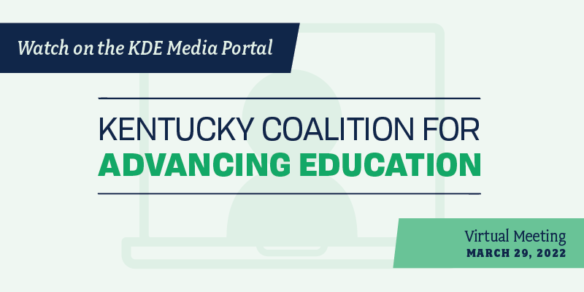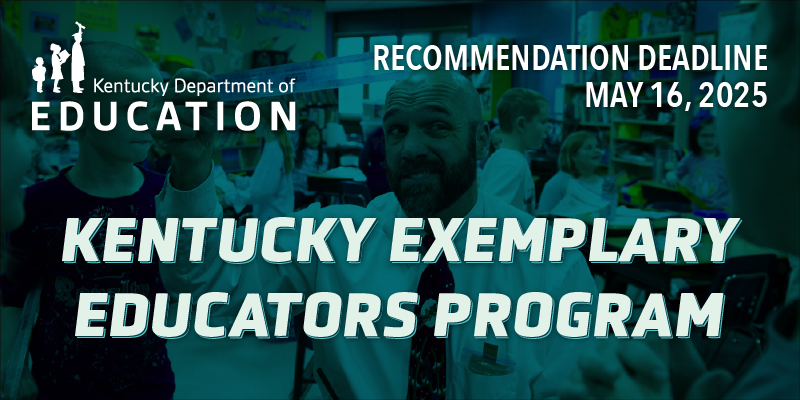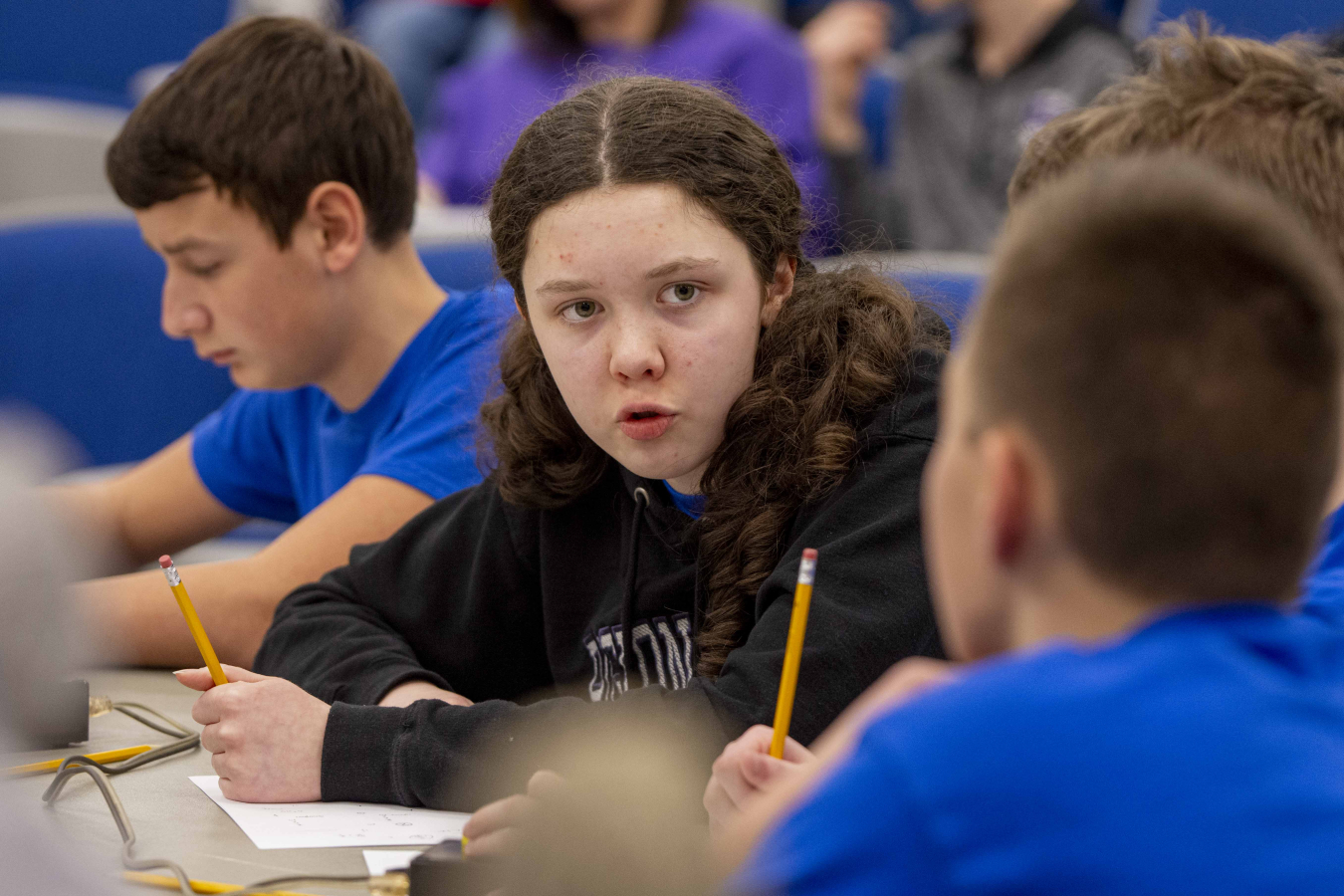 The Kentucky Coalition for Advancing Education (KCAE) met virtually on March 29 to discuss the progress of Cohorts 1 and 2 of the Local Laboratories of Learning (L3) and welcome the newly formed Cohort 3. In fall 2022, Cohort 3 will launch local coalitions in Carter, Floyd, LaRue, Rowan, Warren and Washington counties.
The Kentucky Coalition for Advancing Education (KCAE) met virtually on March 29 to discuss the progress of Cohorts 1 and 2 of the Local Laboratories of Learning (L3) and welcome the newly formed Cohort 3. In fall 2022, Cohort 3 will launch local coalitions in Carter, Floyd, LaRue, Rowan, Warren and Washington counties.
The six districts in Cohort 3 will begin their work April 7 during a virtual L3 orientation session. For the remainder of the 2021-2022 school year, Cohort 3 leaders will observe Cohorts 1 and 2 as they facilitate their local design processes.
The cohorts’ work supports the Kentucky Department of Education’s United We Learn vision to create a more vibrant experience for every student, encourage innovation in our schools – especially when it comes to assessment – and create a bold new future for Kentucky’s schools through collaboration with our communities.
“What our cohorts learn is being used to create a new accountability system that gives credit for the outstanding work already being done in our districts to ensure your students have the skills necessary to succeed in life,” said Education Commissioner Jason E. Glass.
In the fall, Cohort 3 members will begin the process themselves by engaging in local empathy interviews, defining an educational problem in their communities, brainstorming possible solutions and developing a prototype for testing and implementation.
This is called the inclusive design process, where L3s are involving a diverse group of people, including current and former students, parents and guardians, teachers, and local business and community members, as they co-create the future of assessment and accountability.
Cohort 2 is at the beginning of the inclusive design process, putting together their local coalitions and beginning empathy interviews. During the coalition meeting, leaders from the second cohort’s L3s shared updates with the coalition on their progress and what they have been learning about inclusion along the way.
Paula Johnson, Berea Independent’s L3 lead, said she were proud to have representation from the LGBTQ+ community and parents of students with disabilities on their L3 team, as well as from various other groups such as teachers, board members, students and the business community.
“We really feel that in order to truly meet the diverse needs of our students, we must create a place where students can be their authentic selves, where we value and honor their learning, create systems that enrich the whole child and raise voices that have been silent,” Johnson said.
Rachelle Bramlage-Schomburg, L3 lead for Bullitt County, shared that while they wanted diversity among their L3 community members, they found some gaps in certain demographics, such as Bullitt County Schools alumni, students, business owners and community members. However, they are continuing to intentionally recruit for these groups.
“One of the things that we’ve learned is that inclusion takes time, strategy and intentionality,” said Bramlage-Schomburg. “It also takes the hard conversations to address the unknown, not to make anybody feel intentionally uncomfortable but address the things that maybe have been put to the side for so long.”
Other L3s, such as Boone, Greenup, Lawrence counties and Corbin Independent, also said they strive to create a collaborative experience in schools that intentionally invites everyone to the table and includes all voices.
While Cohort 2 is beginning its inclusive design process, districts participating in Cohort 1 are near the end of the process and have created their prototypes and are now in the process of testing them within their communities by gathering feedback that will help them refine their designs before implementing them in pilot sites. Leaders from these L3s joined the meeting to share what they have learned from those tests so far. The Cohort 1 L3s also were encouraged to focus on reciprocity – how exchanging or sharing power or privileges can result in mutual benefit – in their inclusive design process.
Johnson County’s prototype, named SOAR (Success, Opportunities, Accomplishments, Relationships), aims to assist students with career exploration through all grade levels by using a digital portfolio that that shows students’ growth and progress toward their goals.
When testing this prototype, both teachers and students shared excitement and welcomed the possibilities that could come from it. However, the group recognized that some teachers may view this as adding to an already large amount of responsibilities. Johnson County’s L3 community plans to brainstorm ways to “utilize what we’re already doing and connect all the pieces together.”
They also shared that they learned compromise, communication and consistency are needed to drive change and get results that are best for their students.
Allen County’s work received an overwhelming show of support for their Defense of Learning prototype, a year-end assessment where students present their learning, grounded in artifacts and evidence from their own work, to a panel of peers and adults who can offer feedback and support for next steps.
Feedback from their testing showed the prototype was viewed as much better than a single-test model, a more holistic picture of student success and will be more engaging for students as they learn. Allen County is still considering how to make evaluation of the defenses fair, valid and reliable, and plans to develop a rubric around their “Profile of a Patriot” (the school’s mascot) graduate profile to establish clear grading expectations.
The L3 is learning that when co-creation is intentional, with a clear focus on students and outcomes that are mutually beneficial to the entire community and developed through a strengths-based approach, all stakeholders are excited, engaged and willing to support the work.
Doannie Tran, partner at the Center for Innovation in Education, reminded the coalition that “inclusion is not something you can necessarily achieve or arrive to.” “It’s an ongoing process that we engage in with intentionality,” said Tran. “It’s really great to have a space like this where we can push each other and learn from each other about that.”




Leave A Comment